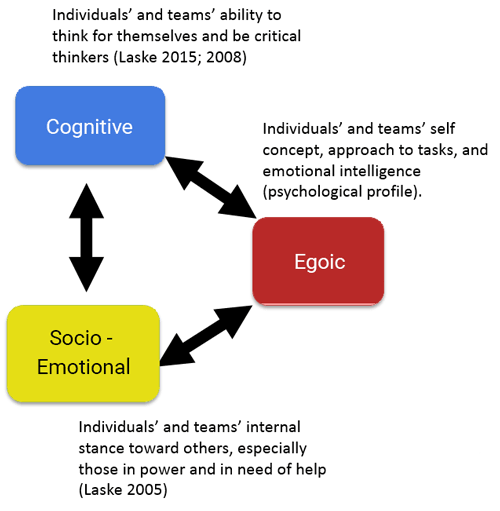This blog introduces a sociological approach to consulting to organizations, with a focus on social capital (Sozialkapital) as the indispensable foundation of value creation and social productivity. The approach, called New Deal, formulated in German (Gucher et al, 2015), is the fruit of new social science research, and is sponsored by Four Dimensions GmbH active in Vienna and Salzburg, Austria. New Deal represents a sociological approach in the sense that it sees work and value creation as a process by which social capital is constantly created as well as potentially destroyed in human interactions. To substantiate this insight New Deal introduces four "new economies" (not found in classical economy): of personal relationships, emotions, attention, and knowledge, respectively. According to this approach, managing the creation of social capital amounts to managing the four economies at all levels of an organization, whether it is hierarchical or not. The blog highlights what is fresh about New Deal in light of North American preferences for focusing on "getting the job done", or remaining in what CDF calls the "Task House". Reflecting on the New Deal approach from an adult-developmental perspective, the blog elucidates why "moving out of the Task House" is a requirement especially... Read More...
Author: Otto Laske
I am the founder and director of IDM, the Interdevelopmental Institute. My background is in philosophy, psychology, consulting, and coaching based on developmental theory to which I have mightily contributed myself. See the blogs at www.interdevelopmentals.org.
Transforming the ‘Human Resources’ Function into the Core of Humanistic Management: Potentials, Requirements and Obstacles
The topic of this abstract for a lengthy article is presently absent from the literature of 'humanistic management' (M. Minghetti 2014), namely, the limitations of human collaborative intelligence that naturally arise from the vicissitudes of adult development over the lifespan. (For example, at level 2 of meaning making (Kegan 1982), especially when accompanied by undeveloped resources for complex thinking (Laske 2008, 2017), levels of collaborative intelligence that can actually be reached are very low indeed.) Limitations of collaborative intelligence pervade every culture, not only of organizations. They define to what degree an organization has the potential to become effectively developmental, thus able of self-transformation. Such limitations, uncovered by empirical research since 1975, naturally arise from differences in emotional and cognitive maturity that distinguish individual collaborators one from the other. Although they are no longer a mystery for researchers, these limitations continue to be disregarded by those who formulate visions of humanistic management, a fact that diminishes the realism of such visions. Transforming the Human Resources Function Read More...
Accelerating Collaborative Intelligence: How to Manage the Transition to Self Organization
Teams and teamwork are the heart and soul of every organizational and institutional project. This is especially true for agile teams. It is not the individual performance or accomplishment that counts, but that of the team. Just like in team sports, the team succeeds and fails together. Up to now, little research on team collaboration that is grounded in empirical studies in adult development has been conducted and published. The topic is still a carefully avoided no-man's land. As a result, strategical advice given and practiced regarding team self organization has pervasively fallen far short of being effective. This is about to change due to the appearance of a forthcoming short book by Jan DeVisch, a professor at Flanders Business School, Antwerp, Belgium, and Otto Laske, Director of the Interdevelopmental Institute, Gloucester, MA, USA. Central to the book are the processes required not only for overcoming stuckness in teams but for developing collaborative intelligence in organizations now experimenting with self-organization in teams. The book is geared to CEOs and Board Members. Senior managers, rather than professional coaches, are considered the main actors. The book promotes the creation of enabling environments for self organizing teams. It serves as a guide to... Read More...
New Dialog Methods for Broad-Spectrum Systems Constellations: Comments on the Milano Workshop on Intelligenza Collaborativa Nel Team
As shown at and, on this website, at , a workshop on new dialog methods specifically for creating collaborative intelligence in teams will take place in Milano, Italy, on January 30-31,2018. The workshop is offered by Consulenza Evolutiva, Milano and its Altroove School, and staffed by Lorenzo Campese, Alessandro Rossi, and Otto Laske. The workshop is a pioneering first in that it introduces Broad-Spectrum Systems Constellations which broaden the focus of attention of conventional constellations as detailed in the attached pdf. The workshop is held both in Italian and English. Those interested in signing up for the workshop with Consulenza Evolutiva will find further details on the workshop process below. Broad-Spectrum Systems Constellations Read More...
Thought Form Constellations as Measures of Team Connectivity
In this article, the author proposes structural, rather than behavioral or emotional, measures of team connectivity and introduces the notion of "cognitive" or "structural" systems constellations. These measures are derived from DTF, his Dialectical Thought Framework, a methodology rooted in cognitive developmental research since 1975. In contrast to the contemporary team literature, and in a follow up of an article co-authored with Graham Boyd on Distributed Leadership found in a book forthcoming at Palmgrave Publishers, UK, (#aboutBook), the author focuses on measuring team connectivity based on a team's cognitive behavior graph in real time. The author teaches DTF to both individuals, especially as coaches, and teams, in hands-on workshops in English and German, and with the help of a translator also in Spanish and Italian. TF Constellations 2 Read More...
A Developmental Systems-Constellation Workshop for Advancing Shared Leadership in Holacratic Environments
Shared or distributed leadership in holacratic environments is often more of a hope or an advertisement than a reality. This is so because leadership is an adult-developmental issue that behavioral training methods are not equipped to handle. However, tools originating in adult-developmental research (since 1975) are still unknown or else eschewed in behaviorally thinking companies, to their own detriment. This article describes the purpose, structure, goal, and outcomes of a workshop based on the Constructive Developmental Framework (CDF). It is an initial offering for preparing a company for undertaking a series of advanced team work sessions. Parties interested in evidence-based deliberately developmental approaches to leadership are invited to contact otto@interdevelopmentals.org. Proposal for systemic constellation work Read More...


